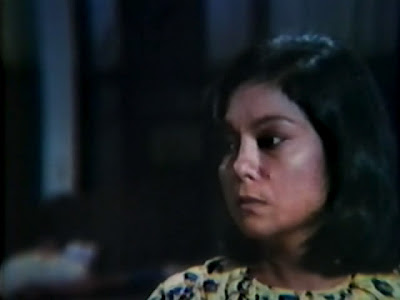Wednesday, February 20, 2013
Thy Womb (Brillante Mendoza)
Thursday, December 27, 2012
One More Try (Ruel S. Bayani)
Monday, October 8, 2012
Bulaklak sa City Jail (Mario O'Hara)
Tuesday, March 20, 2012
Corazon: Ang Unang Aswang (Richard Somes)

In his interview, Richard Somes stated that with "Corazon", he has created a sort of origin story that will back up the whole "Aswang" lore that he has lovingly used in his films. For that matter, with this film, I think that he has embraced and contradicted his statement at the same time; embraced because, as we can all see, "Corazon" is a well-weaved (if not too melodramatic) tale that can really pass us a potent origin tale. But on the other hand, it is a contradiction because, at the end of the film, he has realistically told the tale of 'how' it might have been but he never convincingly stated as to how this could pass as a real 'Aswang' story in the first place.
"Corazon", stripped off of all the folklorian associations, is more a dark psychological film rather than a red-blooded creature feature. With its narrative that immediately connects the whole film's nightmarish ordeal with the hellish Japanese occupation (the film is, after all, a post-Second World War period piece), the paranoia of social discrimination and the flaws of an unguided devotion towards an abstract God, it's quite easy to surmise, through those key ideas, that "Corazon" is more of a sociocultural exploration of the so-called "Aswang" mythos rather than a strictly supernatural one. "Corazon" is your type of "Aswang" film that treads not the 'garlic' surface of it all, but the darker recesses of human frustration and perversion that may 'realistically' lead to something akin to a monstrous metamorphosis.
In terms of the film's whole tone, "Corazon" is sadly less atmospheric than the earlier "Yanggaw", though both boast of beautiful cinematography. And also, "Corazon", with its veritable approach to the "Aswang" lore, is arguably more prone to unintentional comedy. For more supernaturally-oriented films of the same kind, kinetically fast-paced motions of the said creatures are, more or less, understandable. But in "Corazon", with the titular character, a shy young woman, suddenly going quick in his feet as he succumb into a form akin to a monstrous stalker (specifically of children) merely because of a psychological lapse, such rapid change in both behavior and physicality is, I'm afraid to say this, quite laughable in some ways (with the audience's half-serious reaction in the theater that I've watched it in as my witness). Narrative-wise, it is excusable because although how realistic the approach may be, in the end we are still talking about garlic-fearing monsters here. But in terms of character transformation, this treatment to Corazon, from a suppressed woman to a monstrous murdering specimen without even a hint of supernatural intervention, just isn't believable.
But then again, maybe this lack of believability may have rooted from the choice of actress, which completely opposes the back story of Corazon herself. Erich Gonzales, playing the role of Corazon, is beautifully enigmatic and emotionally fragile. But this enigma and fragility is, more or less, leaning more towards the perennially 'Maria Clara'-type, not the 'reformed former prostitute who catered to Japanese soldier' kind. On the other hand, Derek Ramsay's Manuel, Corazon's husband, is a bit one-dimensional (I think the scenes of him holding his knife outweigh those which he does not) but also had his fair share of good moments. While the whole community in the film, however, that which includes the characters played by Mon Confiado and Epi Quizon, was reduced into nothing but a cinematic stereotype whose basic traits include bullying the resident mental case (Tetchie Agbayani) and discoursing about plagues and overall doom by way of their contemplative old-timers.
In its entirety, "Corazon", with its subtitle "Ang Unang Aswang", supernaturally speaking, never really proved to be a convincing origin story or a prequel that can support the events that has transpired in such films as "Yanggaw" or the overall notion as to how these most feared creatures, at least here in the Philippines, came to be. What "Corazon" has done, instead of delivering the immediate epistemology of our local boogeymen, has tackled the so-called origins of 'Aswangs' through sociocultural eyes, with the very 'origin' itself leading not to the exposition of the supernatural creatures' 'humble' beginnings but to the creation of our most primal of fears towards the unexplainable.
Every peculiar sound in our tin roofs, every weird sound in the woods and every howling dog deep within the night, there's this unconscious instinct within us all that immediately associate them to these carnivorously supernatural creatures of the night. "Corazon" strongly suggests a fictitiously alternative reason as to why we do.
1001 Movies You Must See Before You Die







